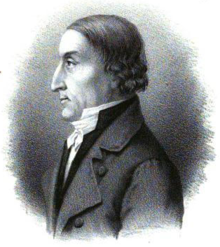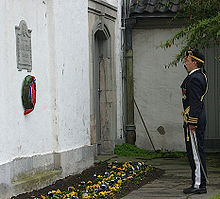Jonas Rein
Jonas Rein (born January 30, 1760 in Øksendal, today part of Sunndal ; † November 21, 1821 in Bergen ) was a Norwegian pastor, poet and member of the constituent assembly Grunnlovsforsamlingen in Eidsvoll .
family
His parents were the resident chaplain and later pastor Ole Rein (1729–1792) and his wife Margretha Hansdatter Ross († 1760). Jonas Rein was his first marriage on December 10, 1791, Anna Cathrine Arbo (1756–1794), daughter of pastor Christian Arbo (1726–1773) and his wife Anne Livia Wølner (1725–1769); his second marriage was on February 25, 1796, Anna Friderica (or Fredrikke) Bergersen (May 21, 1779– February 23, 1856), daughter of Berger Bergersen and his wife Inger Marie Wiig.
As a poet, Rein found himself in the transition from rationalism to romanticism. He was a strong advocate of Norwegian independence in the imperial assembly of Eidsvoll in 1814.
Youth and professional career
Rein was born at Kaplanhof Sandbrekken in Øksendal. The mother died two weeks after he was born. He then grew up in Jevnaker , where his father had become a pastor in 1763. The father taught his children himself.
Rein had been a hypochondriac with weak nerves since his youth . He had a difficult character, and those around him feared his sharp tongue.
In 1777 he passed the examen artium in Copenhagen . After Anneneksamen he began studying theology, but was more interested in modern European literature and philosophy. He became a member of "Det norske Selskab" and became an admiring friend of Johan Herman Wessel and Johan Vibe . After the theological state examination in 1780, he returned to Norway and was primarily a private tutor for noble families in Østlandet until 1787 . He wanted to be a poet. His first work, Hagen og Axel, in the classic French style was printed in Copenhagen in 1786, but was never performed due to a lack of originality.
In 1787 Rein traveled to Copenhagen again and looked for a job. This did not succeed at first, which filled him with great bitterness against the powerful bureaucrats. In 1789 he passed the newly created state examination in philology and hoped in vain for a teaching position at a secondary school. In 1791 he was offered a pastor's position in Kautokeino in the province of Finnmark . However, he preferred to become a resident chaplain in Skjeberg, now part of Sarpsborg , where he was called in 1792. For a promotion he went back to Copenhagen in 1799 and was pastor in Eidanger and Brevik (now districts of Porsgrunn ). He stayed there until he became pastor at the Nykirche in Bergen in 1808.
His poetry
From 1786 Rein had published many poems in Danish magazines. In 1802 a collection of poems came out in two volumes. The basic mood of his poetry is dreary and melancholy. His best works are elegies . His poems Ved Johan Herman Wessels Grav ( An Johann Herman Wessel's Grave ) and En Faders Sang ved sin moderløse Datters Vugge (Song of a father at the cradle of his motherless daughter) are still moving today. A strong social criticism can also be felt in his early poems. At first he had great sympathy for the French Revolution, but it was severely dampened by the terror that followed. But he always followed a religious and moral ideal of freedom on an individualistic basis.
His intellectual background was the rationalism and deism of the 18th century. But he also felt the trend towards Romanticism in German and Danish philosophy, theology and poetry around 1800. He took up impulses from Kant , Schleiermacher and Schiller . He wrote epigrams, one of which is said to have triggered the so-called Holger feud . In 1799 there was a lifelong friendship with the poet couple Kamma and Knud Lyne Rahbek . In 1810 he published another collection of poems. Some of the poems show a change in the treatment of matter from reason to feeling.
Together with Christian Magnus Falsen and Herman Foss , he founded the patriotic magazine Den norske Tilskuer in Bergen in 1817 and also wrote several articles.
At the imperial assembly in Eidsvoll
Rein joined Wilhelm Frimann Koren Christie , who had gathered a circle of intellectuals around him, and founded the company "Quod libet", which should correspond to the "Norske Selskab" in Copenhagen. With Christie, whose political views he shared, he came as Bergen's fourth delegate to the Reich Assembly of Eidsvoll. He was a passionate patriot and a good speaker. Because of his biting sarcasm, he was hated by many of Sweden's followers. He claimed that the future King Karl Johann had only converted from Catholicism to Lutheranism out of a thirst for power and ambition. When discussing the full oath guarantee , he accused the opponents, by which Count Wedel and Severin Løvenskiold were meant, of treason and demanded that they leave the country. His speech resulted in the proposal being adopted by a large majority. But these two speeches probably meant that he did not become Bishop of Bergen after the death of Johan Nordahl Bruns .
In his final years he suffered from severe depression. He was constantly sickly and was embittered and misanthropic. When he died in 1821, he left a wife and six young daughters.
Works
- Hagen and Axel. Et original Sørge-Spil i fem Optog (Hagen and Axel. An original tragedy in five acts). Copenhagen 1786
- Ved Johan Herman Wessels Grav. En Elegie . In: Poetiske Samlinger . 3 pieces. Published by "Det norske Selskab". Copenhagen 1793. pp. 41-50
- En Faders Sang ved sin moderløse Datters Vugge . In: Charis , 1799, p. 123 f.
- Jonas Reins completed the session . 2 volumes. Copenhagen 1802
- Nyeste Digte . Copenhagen 1810
Notes and individual references
The article is essentially based on Norsk biografisk leksikon . Other information is shown separately.
- ^ A "resident chaplain" was permanently assigned to a church, in contrast to the traveling chaplains.
- ↑ The "Examen artium" was the regular entrance examination for university, which required knowledge of Latin and Greek. So it corresponded to the Abitur, but was accepted by the university until 1883.
- ↑ The "Annenexamen" was an Examen philosophicum, an intermediate examination, the passing of which was a prerequisite for further studies for a state examination.
- ↑ D. Thrap: Rein, Jonas . In: Carl Frederik Bricka (Ed.): Dansk biografisk Lexikon. Tillige omfattende Norge for Tidsrummet 1537-1814. 1st edition. tape 13 : Pelli – Reravius . Gyldendalske Boghandels Forlag, Copenhagen 1899, p. 599 (Danish, runeberg.org ).
- ↑ The "Holgerfehde" was a literary-critical dispute in 1789 about the opera Holger Danske by Jens Immanuel Baggesen , the first opera that was written in Denmark. It was modeled on Wieland's Oberon . The feud was about Danish or German identity and about opera as a genre. The poet Peter Andreas Heiberg rejected both the opera as such and the German romantic influence in Danish literature and wrote a parody of Holger tyske . Almost 70 articles for and against the play were written by almost all literary greats in Copenhagen.
- ↑ D. Thrap: Rein, Jonas . In: Carl Frederik Bricka (Ed.): Dansk biografisk Lexikon. Tillige omfattende Norge for Tidsrummet 1537-1814. 1st edition. tape 13 : Pelli – Reravius . Gyldendalske Boghandels Forlag, Copenhagen 1899, p. 600 (Danish, runeberg.org ).
- ↑ D. Thrap: Rein, Jonas . In: Carl Frederik Bricka (Ed.): Dansk biografisk Lexikon. Tillige omfattende Norge for Tidsrummet 1537-1814. 1st edition. tape 13 : Pelli – Reravius . Gyldendalske Boghandels Forlag, Copenhagen 1899, p. 601 (Danish, runeberg.org ).
literature
- Harald Noreng: Jonas Rein . In: Norsk biografisk leksikon ; Retrieved March 19, 2010.
- D. Thrap: Rein, Jonas . In: Carl Frederik Bricka (Ed.): Dansk biografisk Lexikon. Tillige omfattende Norge for Tidsrummet 1537-1814. 1st edition. tape 13 : Pelli – Reravius . Gyldendalske Boghandels Forlag, Copenhagen 1899, p. 599-601 (Danish, runeberg.org ).
| personal data | |
|---|---|
| SURNAME | In, Jonas |
| BRIEF DESCRIPTION | Norwegian poet and full member of parliament |
| DATE OF BIRTH | January 30, 1760 |
| PLACE OF BIRTH | Sunndal |
| DATE OF DEATH | November 21, 1821 |
| Place of death | Mountains |

